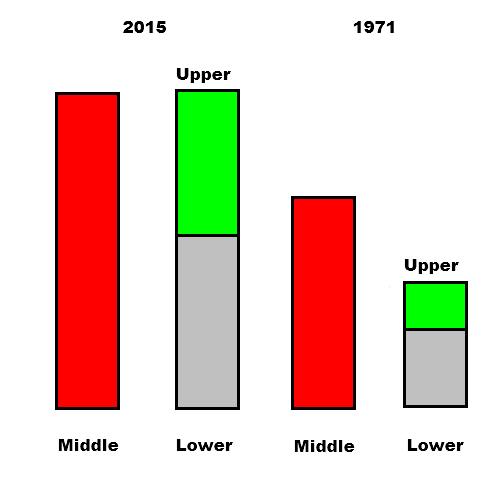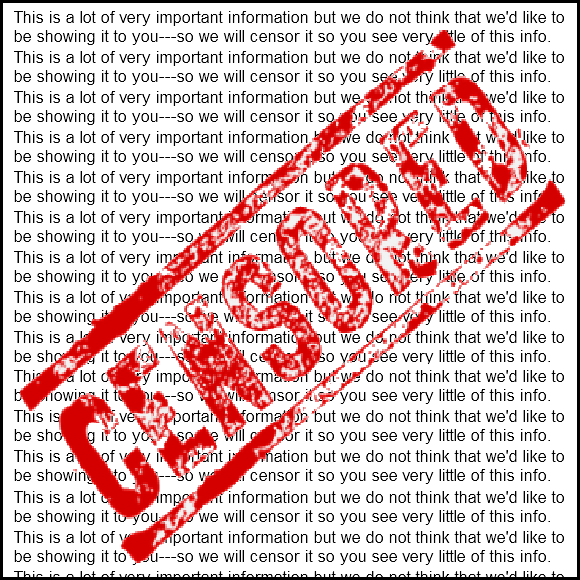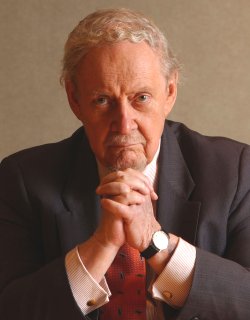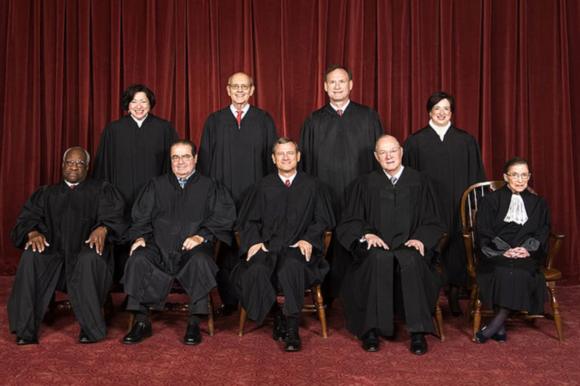To link to this article from your blog or webpage, copy and paste the url below into your blog or homepage.
The Curse of Bigness: Antitrust in the New Gilded Age
a book by Tim Wu
(our site's book review)
The Amazon blurb says that "Persuasive and brilliantly written, the book is especially timely given the rise of trillion-dollar tech companies."—Publishers Weekly
From the man who coined the term "net neutrality," author of The Master Switch and The Attention Merchants, comes a warning about the dangers of excessive corporate and industrial concentration for our economic and political future.

Googleplex HQ
We live in an age of extreme corporate concentration, in which global industries are controlled by just a few giant firms—big banks, big pharma, and big tech, just to name a few. But concern over what Louis Brandeis called the "curse of bigness" can no longer remain the province of specialist lawyers and economists, for it has spilled over into policy and politics, even threatening democracy itself. History suggests that tolerance of inequality and failing to control excessive corporate power may prompt the rise of populism, nationalism, extremist politicians, and fascist regimes. In short, as Wu warns, we are in grave danger of repeating the signature errors of the twentieth century.
In The Curse of Bigness, Columbia professor Tim Wu tells of how figures like Brandeis and Theodore Roosevelt first confronted the democratic threats posed by the great trusts of the Gilded Age--but the lessons of the Progressive Era were forgotten in the last 40 years. He calls for recovering the lost tenets of the trustbusting age as part of a broader revival of American progressive ideas as we confront the fallout of persistent and extreme economic inequality. Look out Google, Facebook, Apple, and Amazon!

Wu wants us to send the trustbusters after the megacorporations helping to cause persistent and extreme economic inequality. Look out Google, Facebook, Apple, and Amazon!

Louis Brandeis and Theodore Roosevelt first confronted the democratic threats posed by the great trusts of the Gilded Age—Tim Wu says it is high time we began trustbusting again
As Wu says, "We have managed to recreate both the economics and politics of a century ago—the first Gilded Age—and remain in grave danger of repeating more of the signature errors of the twentieth century. As that era has taught us, extreme economic concentration yields gross inequality and material suffering, feeding an appetite for nationalistic and extremist leadership. Yet, as if blind to the greatest lessons of the last century, we are going down the same path. If we learned one thing from the Gilded Age, it should have been this: The road to fascism and dictatorship is paved with failures of economic policy to serve the needs of the general public."

The road to hell is paved with good intentions—the big tech companies have only good intentions, and yet their power threatens democracy and precipitates inequality
As Wu says, "The American pharmaceutical industry can raise prices by thousands of percent, confident that government will do little or nothing. The middle class has no apparent influence on policies like health insurance, taxes, working conditions, housing, or other matters that determine how life is really lived."

1889 in the Gilded Age: This is the Senate of the Monopolists by the Monopolists and for the Monopolists
As Wu says, "Can we create broad-based wealth and a sense of entrepreneurial opportunity in an economy dominated by monopolists? Is there just too much concentrated private power in too few hands, with too much influence over government and our lives? The questions, I think, answer themselves. The main goal of this short volume is to see how the classic antidote to bigness—the antitrust and other antimonopoly laws—might be recovered and updated to face the challenges of our times. For roughly a century, the antitrust law served in practice and theory as an antimonopoly code that sought to limit excessive industrial concentration and to police monopoly conduct. By the midpoint of the last century, antitrust became widely understood in the Western world as a necessary part of a functioning democracy, as an ultimate check on private power."
"What is government for? I believe that it is to serve as a countervailing force to private power. But now, as opposed to countervailing, it has become a co-conspirator. . . . Brandeis was worried that employees became almost serf-like in their relationship with these great and unaccountable private powers."—The Nation

Brandeis was worried that employees became almost serf-like in their relationship with these great and unaccountable private powers
The Brandeisian vision points us back toward putting humanity at the center of our concerns. There is another author also putting humanity at the center of our concerns. That will become clear here and here and here.
Everyone knows that over the last ten or so years, Big Pharma has been jacking up its prices in a matter that is unethical, shocking to the conscience, and indefensible. The combined powers of law and consumer protection have done absolutely nothing. It is way past time to get trust-busting. And Senator Elizabeth Warren has led the call for a revived anti-trust agenda against monopoly.

This century, Big Pharma has been jacking up its prices in a matter that is unethical, shocking to the conscience, and indefensible—let's begin trust-busting!
- Beyond Outrage: Expanded Edition: What has gone wrong with our economy and our democracy, and how to fix it
- Corporation Nation: How Corporations are Taking Over Our Lives -- and What We Can Do About It
- Winners Take All: The Elite Charade of Changing the World
- Resistance is Futile!: How the Trump-Hating Left Lost Its Collective Mind
- Profit Over People: Neoliberalism and Global Order
- Requiem for the American Dream: The 10 Principles of Concentration of Wealth & Power
- Search Engine Optimization (SEO), Google, Privacy, and Anonymity
A recent CBS poll finds that “Americans see their leaders in Washington as overpaid agents of wealthy individuals and corporations who are largely disconnected from the concerns of average Americans.” So perhaps something works better than democracy, because democracy is working very poorly for all but the infamous 1%. That is why the 99% did the Occupy Wall Street protest, which had no effect on the fatcat bigwigs but they spoke for most of us with their frustration and disappointment even though the corrupted, bought-and-paid-for media flunkies downplayed it and the authorities oppressed it, sometimes violently, sending the message that "your dreams of democracy in which the right to protest is protected by the Constitution are no longer valid: the elites run things and you saps are seen as troublemakers who the elites want spanked, so spank we shall do and you 99%ers can like it or leave and Constitution be damned." And that was the essense of the event: Constitution be damned.

Wall Street Protest: Occupy Wall Street—Copyright © 2011 by Louis Lanzano

'You know, Archibald, my bladder is a tad too full—do these windows open? I'd like to send my regards to those pesky OWS protesters'

U.S. Middle Class is shrinking and it's no longer the majority; data © Pew Research Center; chart © The Big Answer
Wu claims that antitrust law has lost sight of its goals and has subsequently failed in its core mission. It's Antitrust Lite. Wu advocates the re-democratization of economic policy and the politics of wealth redistribution. That path has produced decades of economic growth which built the middle classes, and saw a level of prosperity previously unknown in human history, reducing what had become a massive gap between rich and poor. Of course, the war of the upper class against the middle class is now going full steam ahead, as the chart above shows. (Also see US before-tax income by quintile).

Wu proposes not a regulatory approach but rather a constitutional approach to the information economy—a regime whose goal is to constrain and divide all power that derives from the control of information
There has been an economic centralization of the once open and competitive tech industries into just a handful of giants: Facebook, Amazon, Google, and Apple. As Wu tells us in The Master Switch, "It is easy to forget that every development in the history of the American information industry—from the telephone to radio to film—once existed in an open and chaotic marketplace inhabited by entrepreneurs and utopians, just as the Internet does today. Each of these, however, grew to be dominated by a monopolist or cartel. But freedom, democracy, rights, integrity—all depend on our having the sense to keep the Internet free.
Wu doesn't seem to understand either technology or the Internet in some critical ways. He appears to mistakenly believe that the Internet's tendency toward decentralization is because of our cultural values rather than because of the technological and business realities that dominated when these systems were designed.
In addition, Media owners all made a deal with the devil a century ago, and they employ filters that serve not the public interest but the interests of the CIA, the owners, the politicians, the oligarchs, the military-industrial complex, the elite neocons in charge, and the shadow government in charge. See Freedom of the Press—an American Delusion, Democracy—an American Delusion, and The Shadow Government.

A truth filter is applied by the mainstream press to please the government, the neocons, the corporatocracy and CIA censors; most countries have filters but we like to think the U.S. doesn't because the media says we don't
Google is a monopoly on steroids. They don't understand how journalism works. The true "watchdogs of democracy" will often express unpopular opinions that go against the government's party line. THIS MEANS THEY ARE DOING THEIR JOB, Google! As most of us know, the Kochs are spending huge fortunes to push climate denialism and Trump played right into their hands. So will this mean that Google will begin de-indexing environmentalism sites as fake news because Big Money is pressuring them to do so? Google's pretentious "anti-fake-news algorithm" (and their teams of censors) are contrary to its civic duty to protect our democracy, freedom, freedom of the press, freedom of speech, privacy, and rights in general.

The ladder of class mobility has been rigged so nonrich can never become rich
Requiem for the American Dream: The 10 Principles of Concentration of Wealth & Power is one of the most important books (and films) ever written, but it has some non-mainstream ideas. Google, will you be dumping it from your search results? That would be very ignorant. It is by Noam Chomsky, beloved around the world for the strength of his personal commitment to the truth as he sees it and for the brilliance of his ideas. He has been called the wisest and most insightful and important intellectual alive.
Requiem for the American Dream is a coherent narrative of the corruption of our American socio-economic-political systems. According to Chomsky, the first principle of concentrating wealth and power is to reduce democracy. You rich people at Google—is this what you are up to? Reducing democracy in order to have yet more power and wealth? Your misguided actions say this is true. Will you be de-indexing this web page because it exposes the overall nature of your recent pre-fascist actions? The purpose of this website is truth delivery, including popular as well as unpopular truths. You're not anti-truth, are you?

Google, we beg you to reconsider your current misguided course of being the internet's censor making sure that nothing of substance shows up in search results

The non-mainstream reporters in alternative journalism are not afraid of the truth even if it ruffles a few feathers
Searchers want real search, not foolish censorship from misguided amateurs! See Google Is the World's Biggest Censor and Its Power Must Be Regulated.

The fastest way for Google to turn into the devil . . .

. . . is by trying to play God
"Earlier this month, Google altered its algorithm – allegedly in an attempt to address the ‘fake news’ problem – and in doing so, a broad array of anti-establishment news organisations, whistleblower, civil-rights and anti-war websites were censored from its search listings. [Google’s chief search engineer, Ben Gomez] revealed that Google had recruited more than 10,000 'evaluators' hired to judge the quality of various websites, 'real people who assess the quality of Google’s search results—give us feedback on our experiments,' though the chief search engineer did not identify the 'evaluators' or explain the criteria against which websites are judged. The ultimate irony: Google has seemingly allowed its evaluators to exercise their own biases when assessing the truth, accuracy and validity of these websites, and in doing so, are censoring essential information inconvenient to the narrative of the Washington establishment. . . . Google is deciding what is an acceptable story, and what is unacceptable, whose views and voices are preferenced, and whose are silenced. There is no transparency and accountability." (Source: The Truth Will Not Be Googled, Tyler Durden, zerohedge)

Google is now censoring content that does not toe the establishment line—like the Chinese government does
"While Google’s Information Age dominance has long been recognized to have some unsavory consequences, the massive technology corporation has, in recent months, taken to directly censoring content and traffic to a variety of independent media outlets across the political spectrum — essentially muting the voices of any site or author who does not toe the establishment line." (Source: Your up-to-date guide to avoiding internet censorship, Eds., mronline)
"Wu’s point is simple. Giant corporations, seeking to protect their advantage, try to turn their outsize economic power into political power. So to break their grip on American democracy, the government needs to break them up in turn. That this proposal might sound outrageously radical to certain ears is, Wu says, just one sign of how unprepared we are for our current moment. To show how busting up big businesses into smaller parts was once a veritable American tradition, he charts how antitrust law emerged in response to the grotesque inequality of the 19th-century Gilded Age. . . . 'What Brandeis really cared about was the economic conditions under which life is lived,' Wu writes, 'and the effects of the economy on one’s character and on the nation’s soul.'" (Source: A Look at Competition in Business Urges Us to Think Small, Jennifer Szalai, NY Times)

Standard Oil before antitrust—Congress is held tightly and the White House is approached
[Brandeis took on the railroads in court and won and] "The result was not only the break-up of the railways, but a new approach to antitrust, and public belief in the idea that government should, as Wu puts it, “punish those who used abusive, oppressive, or unconscionable business methods to succeed”, not only because they were wrong, but because they tended to reduce the liberty and prosperity of ordinary people. Brandeis believed giant corporations tended to rob people of their humanity in the sense that they limited the ability of individuals to work and compete and succeed on their own terms." (Source: The Curse of Bigness by Timothy Wu — why size matters, Rana Foroohar, Financial Times)

Robert Bork
The central argument of The Curse of Bigness: Antitrust in the New Gilded Age is that for the past several decades, antitrust law has become effectively castrated, administered not at all in the manner its original nineteenth-century drafters intended. Instead, antitrust law has refused entirely to recognize the extremely pernicious societal effects of economic concentration, even though it was designed by Congress to address precisely those effects. Wu makes a very persuasive link between the Gilded Age of the late 19th Century when Industrialists like Rockefeller, Carnegie and JP Morgan were a law unto themselves until they were reigned in by Teddy Roosevelt riding a wave of public perception that the Robber Barons needed to be brought under control. Mergers and the era of mega-corporations at the expense of smaller and medium-sized companies have done more to impoverish the middle class than automation or globalization.
See Screwed: The Undeclared War Against the Middle Class—And What We Can Do about It.
How did all this happen? FDR helped the citizens with "his New Deal of Social Security, worker rights and protections, consumer laws, anti-monopoly restraints and other policies that put government on the side of the people, empowering them to counter much of the corporate greed preventing their upward mobility.

FDR helped the citizens with "his New Deal of Social Security, worker rights and protections, consumer laws, anti-monopoly restraints and other policies that put government on the side of the people, empowering them to counter much of the corporate greed preventing their upward mobility
[The] "government's national mobilization for World War II created an explosion of new jobs, growth and opportunities for millions who'd long been blocked from sharing in our nation's prosperity. The war effort opened people's eyes, boosted confidence and raised expectations, leading to a post-war rise in unionism, passage of the GI Bill, a housing boom and a doubling of the median family income in only 30 years. In short, by the late 1970s, we had created a middle class that included nearly 60 percent of Americans.
"Then — pffft — the momentum was gone. Beginning in the 1980s, right-wing Republicans and Democratic comparatists switched sides, and ever since they've increasingly allowed corporate lobbyists and campaign donors to disempower America's workaday majority, further enrich themselves and impose an abominable, un-American culture of inequality across our land." I.e., the greedy corporatocracy robbed the middle class and pocketed the loot. (Source: What Is Killing the Middle Class in the US?, Jim Hightower, Buzzflash)

The greedy corporatocracy robbed the middle class and pocketed the loot
"Only after World War II was being middle-class the national norm, and by the 1980s, it began to decline. President Donald Trump and the GOP have portrayed their tax plan as a boon for the middle class. The sad reality, however, is that it is more likely to be its final death knell." (Source: The GOP Tax Bill Is Middle-Class America's Final Death Knell, Steven Pressman, Newsweek)
As Wu tells it, “If Brandeis had a unifying principle, politically and economically, it is . . . that concentrated power is dangerous, that institutions should be built to human scale, and society should pursue human ends. Every institution, public and private, runs the risks of taking on a life of its own, putting its own interests above those of the humans it was supposedly created to serve.”
And that's the way things have developed—institutions, public and private, are full of greedy people putting their own interests first, and everyone else be damned. Western Europe's middle-class is flourishing with those in charge making sure there's a fair deal for all. The U.S. oligarchy is slowly degenerating toward Russian oligarchical standards, where the rich are the relevant individuals and the nonrich are mere cash cows, working to enrich the greedy rich. Wu says we are CITIZENS, not merely consumers. And, large corporations should not be permitted to become more powerful than government (e.g., regulatory capture, and market domination). Mega-corporations control the media, therefore you don't hear about the loss of good jobs, the loss of innovation, the corruption of the patent process, and all the barriers to competition that hide below the radar.

The U.S. oligarchy is slowly degenerating toward Russian oligarchical standards, where the rich are the relevant individuals and the nonrich are mere cash cows, working to enrich the greedy rich
Trump's plan is to pretend to help the little guy and middle class while screwing them into hopeless debt and robbing them of health care. Unless American citizens start defecating money, the debt has put us all in deep doodoo, robbing us of a decent future.

Unless American citizens start defecating money, the debt has put us all in deep doodoo, robbing us of a decent future

Robert Bork and Ronnie Reagan screwed the middle class and precipitated huge inequality
"Judge [Robert] Bork’s views on competition and antitrust, best expressed in his 1978 The Antitrust Paradox, 'found immediate purchase in the corridors of power'. 'In the four decades since the publication of The Antitrust Paradox, corporate concentration has remade nearly every corner of the U.S. economy'. . . . So, Robert Bork gave us Amazon . . ." (Source: Conservatives against Judge Bork, Alberto Mingardi, Econlib)
"Bork contends that "the only legitimate goal of antitrust is the maximization of consumer welfare." This concept 'provides a common denominator by which gains in destruction of monopoly power can be estimated against loss in efficiency, and economic theory provides the means of assessing the probable sizes of the gains and losses.' . . . [Bork—author of The Antitrust Paradox: A Policy at War with Itself] ignores the corruption and diffuse corporate influence over high-level governmental decisions (the so-called clout) that make genuinely participatory democracy at home impossible and constitute an interference in our foreign relations and in the internal affairs of other states." (Source: Robert Bork , The Antitrust Paradox: A Policy at War with Itself, Paul H. Brietzke, ValpoScholar)

To Bork, smaller companies are proper food for bigger companies to swallow, putting cheaper products in our shopping carts as megacorps exploit economies of scale while getting fatter and increasing salaries of CEOs
Getting stuff cheap—consumer welfare—is the be all and end all of antitrust in Bork's brain. Although superior legal thinkers find this reductionistic, the nation adapted this viewpoint as seen in how, from 1977 to 2007, the Supreme Court of the United States repeatedly adopted views from The Antitrust Paradox as antitrust legislation was slowly but surely made impotent and irrelevant, and now mergers occur all the time unimpeded. To Bork, smaller companies are proper food for bigger companies to swallow, putting cheaper products in our shopping carts as megacorps exploit economies of scale while getting fatter and increasing salaries of CEOs.

Supreme Court of the United States, 2010
Wu argues forcefully that the curse of bigness has infected much more than just the tech industry. For example, look at the market share for the major firms in the oil, pharmaceutical, and chemical industries.
As a result of so much Bork-think, monopolies have run wild and income inequality has risen to a staggering height and political power has shifted to corporate control—i.e., we now live in a corporatocracy. In the 70s and 80s, the Chicago School was effectively selling the ideology of neoliberalism being developed by Friedrich Hayek and Milton Friedman.

As a result of so much Bork-think, monopolies have run wild and income inequality has risen to a staggering height—note the gap between rich and poor
Neoliberal ideology is the foolish belief in the supremacy of "free" markets to drive and govern human affairs. And in the years since the initial publication of Noam Chomsky's Profit Over People: Neoliberalism and Global Order, the bitter vines of neoliberalism have only twisted themselves further into the world economy, obliterating the public’s voice in public affairs and substituting the bottom line in place of people’s basic obligation to care for one another as ends in themselves. In Profit Over People: Neoliberalism and Global Order, Chomsky reveals the roots of the present crisis, tracing the history of neoliberalism through an incisive analysis of free trade agreements of the 1990s, the World Trade Organization, and the International Monetary Fund—and describes the movements of resistance to the increasing interference by the private sector in global affairs.

The truth about the Neoliberalism curse is that in their trickle-down economics reality the nonrich don't get 'trickled down to' but trickled ON!





